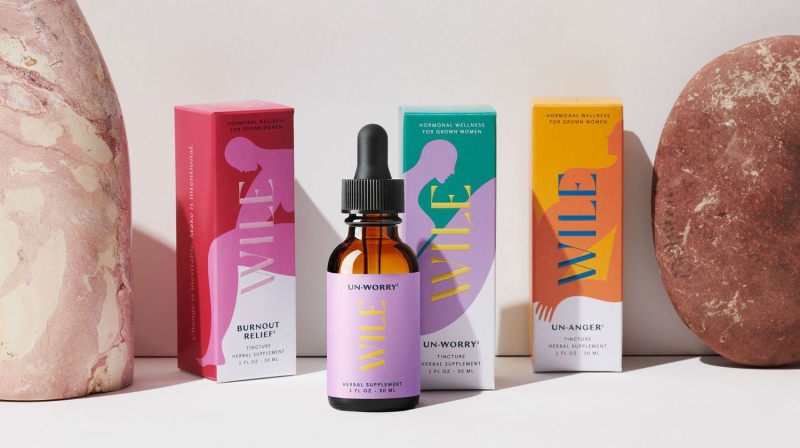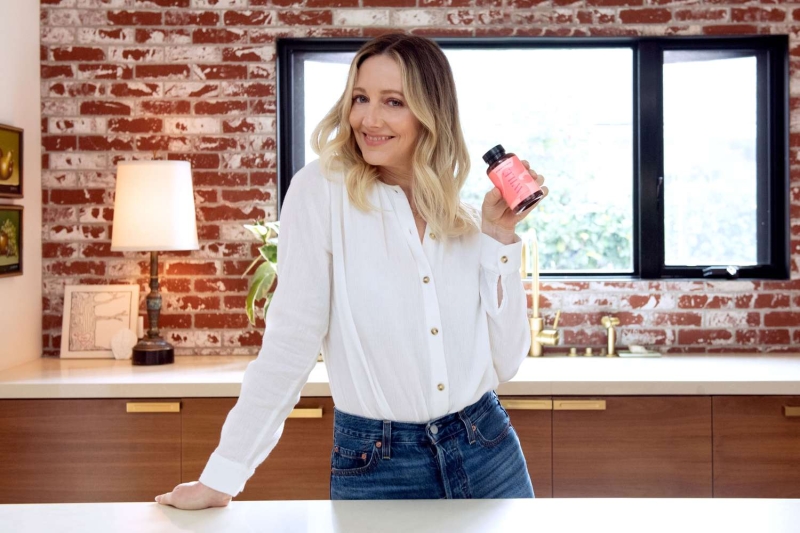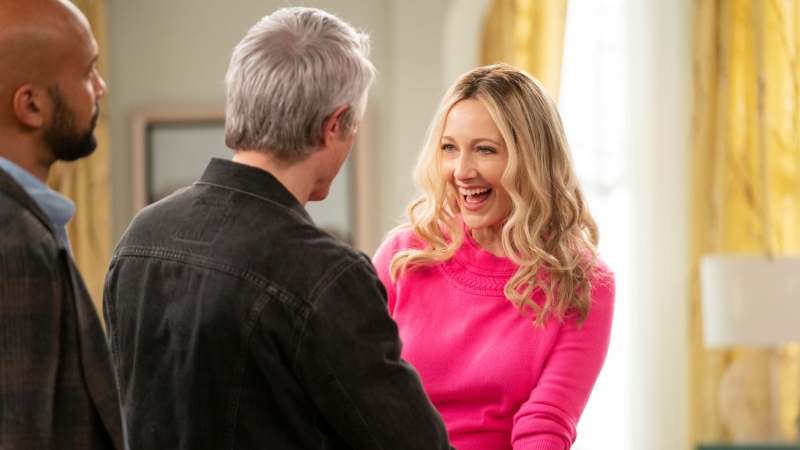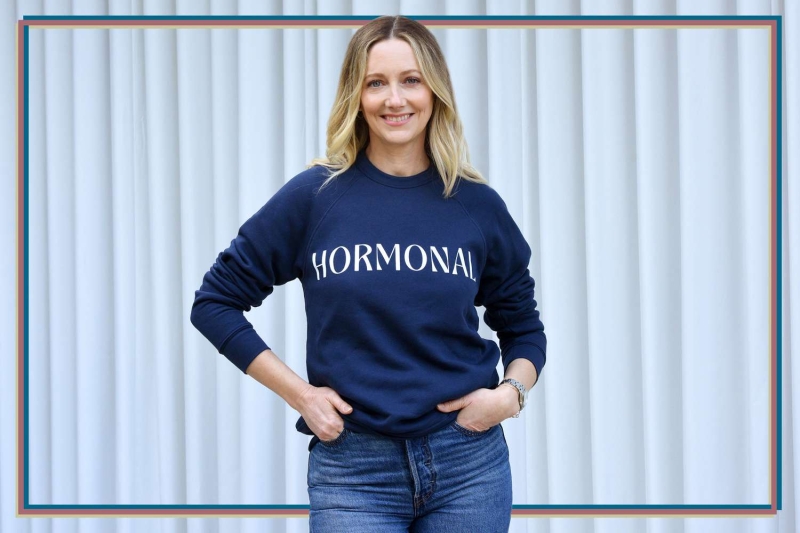The ‘Reboot’ actress shares why perimenopause made her self-esteem “plummet,” and what she’s doing to get it back.
It’s been well established that Judy Greer can play a friend. From the bestie in 27 Dresses to the iconic frenemy in 13 Going on 30 and beyond. But when asked if there’s a Judy Greer character in her life, she reveals the truth behind the typecasting.
“I feel like I'm the Judy Greer character to all my friends,” she laughs over Zoom. “Like they're all the stars, and I'm like their support staff,” she says, referencing a few close girlfriends she loves to cheer on. So it’s true to form that Greer has taken it upon herself to open up about approaching menopause not just with those pals, but with all of us who see her as one by virtue of her being so damn believable on screen.
By joining the wellness brand Wile as a founding partner, Greer has chosen to reveal rather than hide her experiences with aging — specifically the moodiness, brain fog, and sleeplessness of perimenopause — while taking that experience into her own hands with the brand’s plant-based supplements and tinctures.
It's nice to have some support for this chunk right here. [Age] 40 to 65 is this big void that we're just supposed to figure out. Like, really, you're just gonna ignore us for 25 years?
“I joined the company because I felt like the products worked for me. But whatever I can do to make women feel better about themselves — if I can be a part of a company that makes products that help — that's a dream,” she says.
At a women’s magazine with a “you do you” ethos about beauty and style, aging can bring us into murky territory. If you want to put cream on your face to smooth out wrinkles, get injectables, change your hair part or wear Gen Z’s choice of jeans, we support that. We do not banish the word “anti-aging” nor do we think it should be forced upon anyone who’s earned their stripes. But that’s all about the outward performance of age and beauty, when the changes that hit as we enter our 40s go so much deeper, and as Greer shares, the silence around them can be crazy-making.
“So much emphasis is on when you first get your period. And then it's all about trying not to get pregnant, then it's all about trying to get pregnant, then it's all about your kids, and then it's like, ‘Good luck with the rest of it, ladies!” Greer says. “It's nice to have some support for this chunk right here. [Age] 40 to 65 is this big void that we're just supposed to figure out. Like, really, you're just gonna ignore us for 25 years?”

Greer, who is 47, is married to the producer Dean E. Johnsen and step-mom to his two grown children, and she gets energized thinking about the untapped market of women in her cohort. “We have time again; our kids are growing up; we are spending money on ourselves, hopefully, and we are spending time on ourselves.”
Wile meets women in those moments with adaptogenic drinks (Tranq Drank, a stress-relieving brew with a funny name and a kombucha-like taste), supplements for sustained hormone management, and targeted tinctures for fast relief (names like Un-Anger, Burnout Relief, and Un-Worry make grabbing the one you need simple).
Greer says she’s still in the early stages of perimenopause — which lasts an average of four years, and isn’t considered over until 12 months pass without a period — but experiencing brain fog when she was around 42 was a first sign that things were changing. “Brain fog, having insomnia, being really cranky, being really moody: those symptoms I noticed right away and I was like, ‘What’s going on?’”
The New Old Stacy London
There were physical changes, too. “You know, like gaining a couple pounds over the weekend, you could lose it by Tuesday, and then all of a sudden it's like, ‘huh, that doesn't seem to be coming off as easily anymore,’” she says. This was all happening while she was filming the FX series Married, playing a keyed-up wife who had cooled to her husband’s touch. “I remember complaining about it to Suzy, my on-set costumer, and she was like, ‘Oh, yeah, you're perimenopausal.’ And I was like, ‘Fuck you!’”
“To me, anything related to the word ‘menopause’ at the time was, like, ‘then you're old and you're irrelevant,’” Greer recalls, but she took to Google anyway. And finding out how long perimenopause can last and the myriad ways it impacts a person’s life was sobering. “I was like, this is crazy that this goes on for so long and nobody's talking about it. And why is the first time I'm hearing about it from Suzy?”

Greer says she went marching into her gynecologist’s office demanding answers and was offered birth control to regulate her hormones (though taking these over age 35 has been associated with an increased risk of heart attack and stroke in some women) and Prozac to regulate her moods. She declined both, and in her work with Wile has found plenty of company with women who want other answers, too.
“I know women who have had such extreme experiences that they almost get divorced,” she says. “I never was close to divorce, but I could see, intellectually, that my reactions were overblown but I couldn't control it. Or something would set me off that never bothered me before. And the sleeplessness. You feel like you're crazy if you're not getting sleep; it was messing my whole day up.”
The Rage Is Real — Here’s How the Transition to Menopause Affects Mental Health
As she explains how mood changes and sleeplessness became harder to manage, she’s struck by the notion that the realest signs of aging are changes in how you feel. “Am I feeling gratitude for my life? Am I feeling confident, am I feeling like I’m putting my best self forward when I walk into a room, am I feeling like I got this? I used to always feel that way and I stopped; it kind of started to dwindle and diminish, and that was horrible for my confidence, especially being someone who has to perform for her job every day,” Greer says. She’s not the first to connect menopause to adolescence (in our cover story, Naomi Watts calls it the bookend of puberty). “I was feeling, for the first time since I can remember in high school, my self-esteem starting to plummet.”
And a skin cream is not going to fix that. “So, you know, I’m happy if my skin is glowing and moisturized,” she laughs. “And I’m happy if I don’t look really wrinkly, but at the end of the day, it’s about how I feel.” So she swears by Wile’s 40+ Hormonal Wellness supplement, another called Women’s Stress, and tinctures like Burnout Relief for an afternoon boost and Un-Worry for sleep. One dropper of the latter leaves a pleasant cinnamon-nutmeg burnt tongue sensation like smoking a clove cigarette, and if you’re old enough for that reference to connect, you might want to consider getting some.

In another instance of Judy Greer life imitating Judy Greer art, she’s exploring aging on the new Hulu show Reboot, as Bree, an actress who comes out of retirement to bring back a family sitcom from the ‘90s, alongside its other aging stars played by Keegan Michael Key and Johnny Knoxville. Greer gives Bree her typical effervescence but, it should be noted, she’s no one’s sidekick this time. She’s hilarious, meta, and at one point completely topless.
“It was a funny moment and furthered the comedy, which I'm sort of more comfortable with than, like, showing my boobs in some gnarly sex scene,” Greer says. “When it's in a comedic scene, I've never really been super shy about that kind of thing. I'm sure that some people in my life wish I was more,” she laughs, and explains that the boobs bit was kind of an accident. First she tried all the tapes and tricks to simply suggest toplessness. “Shooting around all that stuff can be a pain in the butt. So I was like, ‘I'll just not wear it, and then we just won't use [that part]. And then when they were cutting it together, they were like ‘Well, this is kind of the funniest version. So I watched it and I was like, ‘Yeah, it's kinda funny.’ It was a quick second, and I was like, ‘They look good.’”
Another moment of comedy gold is when Bree arrives in wardrobe and finds an array of Spanx have been left for her. This, too, is taken from Judy truth.
“I definitely wear Spanx all the time, and that stuff in Reboot is real,” she says. “I told [show creator] Steve Levitan about my Spanx. The only difference is I asked my costume designer to put all the Spanx in my room, and they gave me drawers full. So I was talking to Steve about that, and we were both laughing, and then in [the show] they just put it in Bree's room, which is way funnier and way more offensive to Bree.”
Greer has a way calmer attitude about it than her character, who’s recovering royalty, but that doesn’t mean she’s never experienced age shaming IRL.
“I did a photo shoot once where they brought all this face tape. It's kind of like a face lift where they yank your face, tape it, and, like, tie it under your hair so that you're kinda stretched. I mean, look, it was also kind of awesome. But it was weird to go to a photo shoot and have a makeup artist have that. And be like, ‘Well, we use it on all the models.’ [I remember] thinking, ‘Jesus, if you're using it on those beautiful young women, you're gonna run out of it on me!’”
It's an interesting time for actresses: I think we're trying to [swing] the pendulum away from so much ageism and there are so many great roles now for women of all ages. I'm feeling the change, and it's really nice to not just have to be someone's mom all the time.
Once, while shopping, Greer was approached by a store clerk who asked if she was an actress. "And I said, ‘Yeah, I am; I get that a lot.’ And he was like, ‘I didn't know if you were an actress or a friend of my mom's,’” she laughs. “I went home from that store and I took off my whole outfit and put it in the Goodwill bag.”
Exchanges just like that definitely show up in Greer’s scenes as Bree. “My character on Reboot is dealing with all the same things that, like, Judy's dealing with. It's a little different because she's been totally off the map for 15 years, and I've been crawling along with everyone else here in Hollywood,” she says. “It's an interesting time for actresses: I think we're trying to [swing] the pendulum away from so much ageism and there are so many great roles now for women of all ages. I'm feeling the change, and it's really nice to not just have to be someone's mom all the time.”
She finished two independent films this summer — including Eric Larue, in which she stars opposite Alexander Skarsgard, as the mother of a high school shooter — as well as an HBO limited series, White House Plumbers, via the creators of Veep and Succession. Meanwhile her animated FX series Archer got picked up for a 14th season. But there’s one role she loves looking back on.
I Hate My Acne But I Still Love Myself
“I always see pictures of myself and Jen [Garner] in 13 Going on 30 at the ‘Thriller’ dance, in this cool, mermaidy look. I think of that outfit in that movie a lot. When I put that dress on, I was like, ‘Oh my god, it’s so tight, it's gonna show every curve, I'm gonna not be able to eat for three days,’ and feeling like, ‘do I look fat?’ I hate saying that and then looking back on it now, I'm like why weren't you just so happy with how you looked? Why weren't you just so confident? You looked amazing, Judy of 17 years ago. You looked so good and you should've been so happy — and you should've dressed way sluttier!”
She goes on to say it can be a lesson to all of us. “I wish I could tell that Judy Greer, ‘enjoy that outfit and you look so beautiful. So, I tell her today.’”
It seems pretty obvious what the upside is of being Judy Greer’s current age. The variety of projects finally showcasing her range; the confidence to wear what she loves and look back on past moments with more appreciation for how great she was then, too. But for her it’s simpler than all that. “The upside is that, I mean, it’s certainly better to grow old than not to grow old; it's certainly better to have birthdays than not to.”
